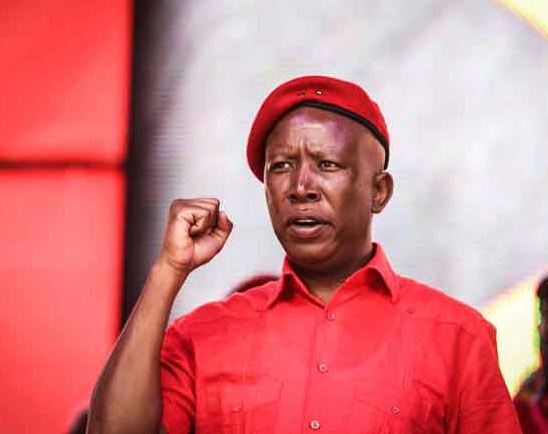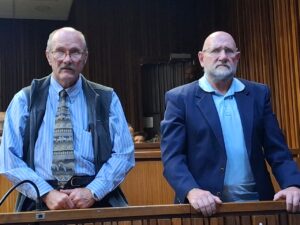By: Thami ka Plaatjie
I recently watched with a sense of bewilderment and was for a moment, briefly concussed when it donned on me that the onus of defending our liberation values and its vested heritage has now rested and fallen on the shoulders of Julius Malema. Such an enormous historical obligation etched in centuries of pain cannot be abrogated to one individual. I dare say. But if the keepers of dreams are in slumber, then no one can be faulted for taking up the gauntlet.
The elders’ muted voices could only be detected by their seismic conspiratorial silence. Most of those who composed these songs, for which Malema stood trial, might have passed on, but many who sang them in defiance at the height of struggle watched Julius Malema from the comfort of their homes as though tuned to a TV soapie.
On the 1st of October 1963, Richard Matsapahae, Josia Mocumi, Thomas Molatlegi and Petrus Mtshole became the first political prisoners to be hanged in the Pretoria Central prison. On 16 March 1962, Jim Mountain Ngantweni, Zibongile Serious Dodo, Nontasi Albert Tshweni and Donker Ntsabo, were hanged on 31 October 1967 for political crimes. Many others followed to face the hangman’s noose until around 1982.
As they faced the gallows these Poqo fighters sang a song that reverberated through the gilded corridors of shame. They coloured the dark and dime ambience of hell with high morals and with gaiety spirits assured that their death was not in vain. Mr Nkinti told me in an interview that when he visited his cousin Zibongile Serious Dodo on the eve of his execution he found him and his group shouting in song:
Amabhulu anetyala,
Ityala labo linzima
Bazoyithethinyani ngesbhamu,
Badubuleni ngesbhamu.
(The Boers are guilty
Their sin is heavy
They will tell the truth when shot
Shoot them with a rifle)
Some of those who were hanged had already been serving lengthy prison terms on Robben Island. They were taken from their cells, after being convicted in other cases and sent straight to the gallows. hi
Mariam Makeba, after the tragic events of Sharpeville Massacre on the 21 St March 1960, burst with lyrical anger piercing the foreboding sky with her thundering voice;
Sizobadubula,
dubula dubula
ngembhayi-mbhayi
UVerwoerd, uyabaleka , sizomthola .
( We will shoot them
with a machine gun.
Verwoerd is running away
but we will find him.)
Members of the Azanian National Youth Unity (Azanyu) in 1983 sang this song in their inaugural conference.
Fascists, dogs,
bloodthirsty thieves,
I curse the day
when they reach Azania,
Freedom in our lifetime.
They come from the sea
And found us, peaceful men,
I curse the day
when they reached Azania
Freedom in our lifetime.
Years later the great, great, great-grandchildren of pirates wish to tell the great-great-grandchildren of the victim of their parents which song to sing. The naked audacity of the vestigial of settler colonial rule telling the oppressed how to react to their oppression is unthinkable.
Unwittingly, AfriForum is reopening the wounds of the past and cursing the memory of our forebears. This very act will Re-Energise our people into a bitter resistance to continued white domination.
The nerve and callousness of those who have stolen our land, telling us how to ask for our land back in a manner that is acceptable to them and not in any way pernicious. Their gravamen is disgust at our pain, after all, they brought us civilisation and we must be eternally grateful.
The brute gut of taking offence at our reaction to their oppressive system is insulting enough. They wish to choreograph the tempo, tune, temperature and tenor of our reaction. They take us to court, wanting to edit our songs born of pain and suffering inflicted by them. A lion, telling the lamb not to cry when it will be served for dinner. The lamb must express its pain in a manner acceptable to the lion.
What is evident is that whites in this country through AFriForum, are hell-bent to protect their racists’ Interests. They will go to all conceivable lengths to protect their Interests. Alas, we ask, who is there to protect the interests of the vast African majority. The masses have to come to realise that as Steve Biko stated: “Black man, you are on your own”.
We sang many songs at the zenith of our struggle and we will continue to sing them until our land is restored to its rightful owners. The verdict of the AfriForum case is inconsequential, academic and at best peripheral. No one, not even a court ruling can censure our song and mute our tongue from telling and sharing our life experiences through song. It is curious how they hope to enforce such a court order if they make an adverse one.
Our songs, our heritage, our history, our sacrifices and our suffering were on trial thanks to the racist supremacy of Afri Forum. When our forebears were sentenced to hang in the Pretoria Central Prison and climbed those steps unrepentant and gallant, they were ostensibly accompanied by song. They sang their hearts out emitting the last liberatory lyrical notes that reverberated in the dark chambers of the death row.
When our forebears stood trial at the Treason Trial they sang in unison:
Thina sizwe,
esintsundu,
sikhalel”umhlaba wethu. Owathathwa ngabamhlophe.
( We the African nation.
Are yearning for our land that has been taken by the whites.)
The problem with South African politics is that it has become devoid of politics. Africans have been told to forgive and forget whereas whites still remain arrogant, boisterous and thuggery. The courts are their new battleground and this constitution is their ultimate weapon. They have weaponised the law so much so they look at us with a scornful face.
The obsession with reconciliation has made us numb and oblivious to obvious historical hurts and pent-up pain that our people still endure. The failed Truth and Reconciliation Commission has opened more wounds that it has been able to soothe and ameliorate. The cowardice of our leaders and their disregard of the plight of our people have rendered our struggle a shameful artefact.
The deep pain of national hurt still lingers on and is daily evident in the sporadic eruption of incidents of race and Nazisim. The fact that there is a so-called African majority rule does not and will not expunge the recurrence and prevalence of racism and white supremacy. It is tragic that an African majority is subjected to white supremacy and white domination in their land. We have acquiesced to our oppression and thraldom.
The recent case of Julius Malema and AfriForum has provided a veritable platform for the re-enactment of that pain. Unbeknown to the Afri Forum, they have vividly brought home the cold and callous reminder of racism and oppression. It was not Malema on the dock but our collective history and sense of nationhood.
That the onus fell on the young Malema to shoulder the unenviable responsibility of reminding racists supremacists whence we come could be a strange twist of fate given the fact that he was not even born when these songs were conceived. It is tragic that some, if not most, of our leaders have exonerated themselves of that historical task since they have moved on building a nation on false pretences and a flimsy foundation
Every song that we sang was not an idle poetic appreciation of some flowers or state of weather but an expression of deeply felt experiences of pain, anger and of a yearning for freedom and justice.
Our people are composing new songs about the state of their nation and the painful fillings of betrayal. Songs about the natives that are allowed to keep the political levers of powers for so long as they will allow whites control of the economy are sung every day. Songs about a few natives who are given shares in the transnational and multinational mining houses and are made the models of success to be envied and emulated by the poor are sung.
The psalmist song chastise us thus:
Behold the darkness that
has enveloped the world,
Behold the remorseful darkness,
We await the emergence of the sun
Beautiful star of light
Come break the darkness
We await in eager anticipation
The break of dawn.








Julius can’t carry the Pan Africanist Cross it to heavy for his and his Noe- Charterist and watered down Pan Africanism.
The onus lies on as many of us as possible to get off our f tu ituciding backs add value to the archives of our history by contributing positively what we know meaningfully to enrich the legacy left by those who sacrificed for this nation, instead of gleefully pulling down what little effort others are making in our usual PhD aka pull him/her down style.